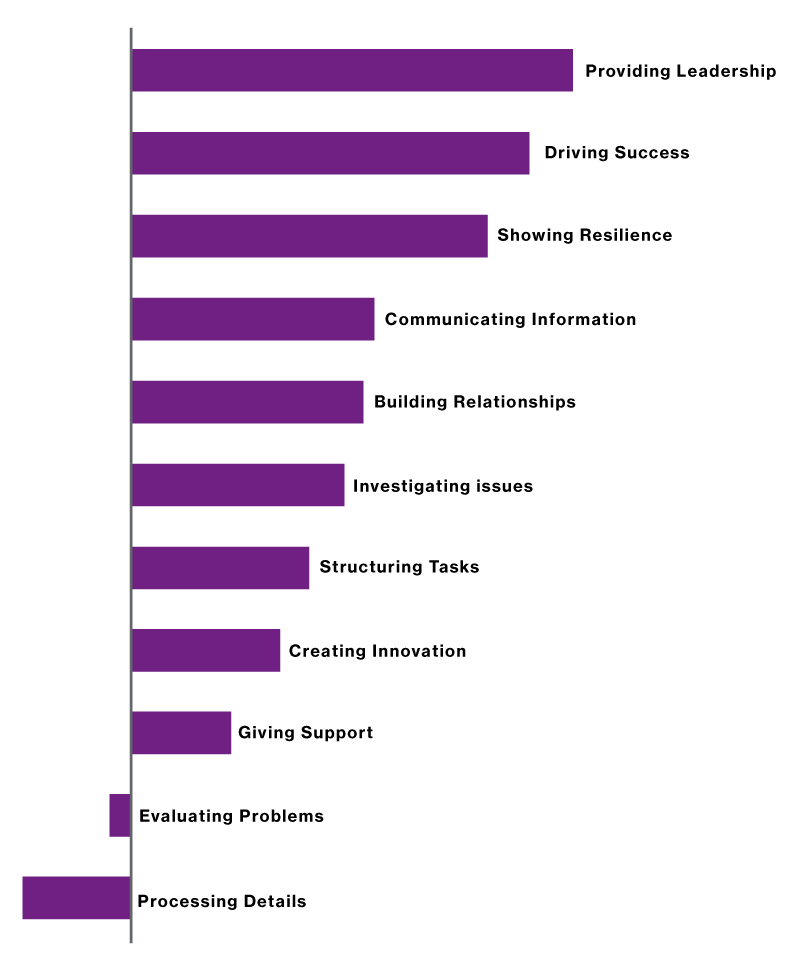Organizations and their people have been operating in frequently changing environments prior to this situation, but the current level of change is unprecedented. The long-term impact is still undetermined. Understanding which behaviors can help leaders and their teams successfully navigate change is key to ensuring success in times of rapid transformation.
In the past few weeks, we have all had to adjust to change. Changes to where we work, how we work, and the redefinition of work/family time have all impacted on our ‘normal’ way of doing things. This led us to question which behaviors are most associated with being effective in change by interrogating our data base that links behaviors to performance at work.
The aspects of behavior most directly linked to adjusting to change are being positive, being receptive to feedback and being flexible, but what are the other behavioral characteristics that allow individuals to be effective at handling change?
Average Strength of Correlation with Adjusting to Change Ratings (N=1,378)

Using Behaviors Effectively
Providing Leadership and Driving Success
In times of flux, providing leadership is critical. Individuals that can make decisions, give clear direction, motivate and are encouraging to others are likely to be those that can provide the most effective leadership. They will, without a doubt, be amongst the most successful at helping themselves, their organizations and others deal effectively with change.
Individuals who take action, seize opportunities and pursue goals tend to be those who can best drive success regardless of the situation. However, when things need to change, these are the people who don’t wait passively for things to happen, but instead have a greater inclination to question what can be done differently. They are adept at looking at how best to adapt and work out ways to keep people motivated. Identifying individuals who effectively demonstrate these behaviors and engaging them to lead others on new initiatives that may be required will help urgent work issues get resolved faster.
Showing Resilience and Communicating Information
Perhaps it is no surprise that showing resilience is also important when it comes to adjusting well to change. If you have a leader and/or workers who show composure and convey self-confidence then it is likely that their presence, albeit remotely, will be of benefit to others who may be finding the current situation particularly difficult.
Communicating regularly and staying in touch, both within teams and across the wider business, enables others to cope better with change and means new processes can be rolled out more efficiently. Leaders and individuals who can effectively articulate revised ways of working in a convincing way will help ensure that information can be shared successfully across the business.
Building Relationships and Investigating Issues
It is also important to look to those who find it easy to build relationships with others to help share positive messaging and keep morale high.
Rapid change requires a large degree of insight. Organizations need to be sure that new processes that are quickly rolled out will be effective. A high degree of expertise is required. For that reason, those who exhibit the behaviors needed to effectively investigate issues will help keep an ear to the ground to understand how new processes can be best implemented, further improved and adapted to best fit the new way of working.
Knowing where to place support
While there is little doubt that everybody will find the present situation difficult, it is worth also looking to the data to understand why some individuals may be finding it particularly difficult and therefore require a greater amount of support.
Individuals that are more analytical may tend to dwell on the negatives of a situation for longer. The way individuals complete tasks can also have an impact on how well they adjust to change. Some people prefer to work with a known set of procedures to follow. When these are suddenly challenged due to imposed changes, those individuals who like to rigorously follow procedures and meet tight timescales can find it harder than others to adapt their working style.
Individuals who naturally tend to be more supportive in their behaviors, provide understanding to others and are team work focused (but aren’t necessarily focused on taking on a leadership or goal-orientated role) may find that their working style makes it more difficult for them to adjust to the challenges of remote working. In addition, individuals who are usually the first to give support to others can be easily overlooked when it comes to identifying who may need to receive support.
So, How Can We Best Use This Information?
-
- Ensure those who are naturally high on the behaviors that will positively affect their ability to adjust well to change are making the key decisions, providing direction and motivating others.
- Work with managers to develop their skills in the behaviors shown to be most effective at dealing with change. Help them understand how they can build on their own strengths which in turn will have a positive impact on team members.
- Look at group data for your teams and work on building the skills required through simple coaching initiatives that can be rolled out virtually to help build overall effectiveness at adjusting to change.
- Be aware of those that might need additional support due to their natural working style and set aside time to spend with them to ensure that they learn to adapt to new ways of working.
To find out more about quick and effective ways for all levels of the organization to understand their behaviors and how best to support individual development through virtual coaching, get in touch with us at mail@savilleconsulting.dk.
Alternatively you can join our upcoming free webinar Digital Development – Creating a Virtual Coaching Culture
Article written by Katie Herridge, Lauren Jeffery-Smith, Rab MacIver & Hannah Mullaney.
April, 2020

